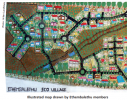Land Library
Bienvenue dans la bibliothèque du Land Portal. Explorez notre vaste collection de ressources en libre accès (plus de 74 000), comprenant des rapports, des articles scientifiques, des articles de recherche, des publications évaluées par des pairs, des documents juridiques, des vidéos et bien plus encore.
/ library resources
Showing items 1 through 8 of 8.The USAID's Investor Survey on Land Rights aimed to provide a more systematic understanding of the drivers of tenure risk to land-based investments from the perspective of the private sector, and of how investors and operators assess, mitigate and are affected by such risks.
In both climate change adaptation and mitigation, contentious struggles for access and control of resources may turn violent unless stakeholders from the local to the international scale engage in open and transparent processes to negotiate new rules of access to land and other natural resources.
This report synthesizes the findings from field research on land and natural resource tenure in 11 administrative clan units (henceforth referred to as „clans‟) in Liberia, including Ding, Dobli, Gbanshay, Little Kola, Mana, Motor Road, Saykleken, Tengia, Upper Workor, Ylan, and the community of
On Thursday, April 21st, USAID and the MCC co-hosted a Side Event to the World Bank’s Annual Conference on Land and Poverty entitled “Roundtable Discussion on Land Access and Responsible Agribusiness Investment.”
This case study draws on an analysis of urban land markets in the East African region. The research was undertaken by Paul Syagga, School of the Built Environment, University of Nairobi, and commissioned by Urban LandMark.
This case study is based on research undertaken into the experiences of a poor community in accessing land through formal channels in peri-urban South Africa. The research was conducted by a team of researchers pulled together by the World Bank.
This case study examines specific examples of localised and informal land registration practices in South Africa.
This case study draws on research into some of the processes through which people access, hold, and trade land in poorer areas of towns and cities.






